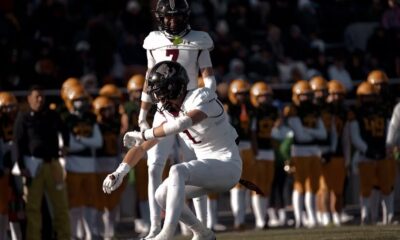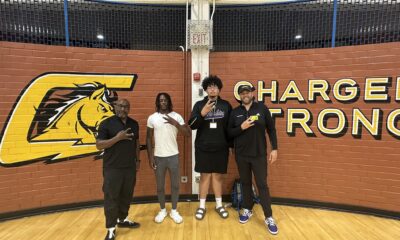Shoulder to shoulder they stood in Washington’s locker room as head coach Kalen DeBoer introduced his front line. Sure, their role on the team is to aspire to live in anonymity, but DeBoer wanted the rest of the team to appreciate their efforts week in and week out.
But, after the introductions a chant from the players spread around the room quickly: “What about Mike? What about Mike? What about Mike?”
Content to let others have time limelight, Mike was drawn out from behind the front line. With a rather large grin, yet with elements of shyness in his eyes, Mike came out, front and center.
A huge cheer erupted when DeBoer proudly introduced Mike, his lockdown locker room custodian.
If there was a Heisman award in his industry, he’d be the leading candidate. He makes sure that everything is in ship-shape before, during, and after team activities.
The rest of DeBoer’s “starting lineup” was various custodial support individuals all of whom DeBoer knew by name—and whose value he also knew.
As a young head coach at the University of Sioux Falls in South Dakota, he fulfilled many of their duties while also serving as head coach.
By recognizing them and honoring their individual efforts he created a pride of ownership and a highly functioning group. As studies have shown, this type of random reward produces high achievers in their respective disciplines.
That recognition has trickled down to his players.
After Saturday’s 36-33 victory over the Oregon Ducks, arguably the biggest game for UW in the last 15 years, the stands were completely empty, even the band had left the field and a few coaches children scrambled around the purple “W” at the 50 yard line.
Outside the stadium, the parking lot was emptying save for a few revelers, who still clung to their Penix for Heisman shirts, or their hand made signs there.
The stillness was interrupted by a “wow, thank you man!” from the security guard at the opening of Washington’s tunnel.
Washington edge defender Sekai Asoau-Afoa, who just had “the game of his life”, according to defensive coordinator William Inge, hand-delivered a boxed Chick-fil-A meal.
The game had been over for over an hour and Sekai, still in some of his game attire, but down to his football pants, under shirt and socks, was thinking bigger picture like his DeBoer.
Continuing to walk out to the goal line that he’d spent the afternoon defending, Sekai delivered another meal to another security guard.
And a hug.
“Unreal,” the astounded security guard said.
It’s not just coach-speak when DeBoer says, in fact, all of his coaches say that they’re creating better men along with winning games. His players are now replicating what he’s modeled.
The saying goes that “integrity is what you do when nobody is watching”.
It’s all part of his master plan that DeBoer has taken with him on his coaching journey. They are part of his core values of valuing everyone.
Giving each person a reason to take pride in their own job—to understand ones own purpose. No matter how insignificant one may feel their job is, DeBoer and his staff recognizing and honoring each person in the organization has produced a culture that’s resistant to the pitfalls of hubris.
He never lost his vision of the construct of a successful organization from his USF days that netted him three national championships. It goes well-beyond coach speak—it’s in his actions and how he empowers every single person in the organization.
It has transferred to his players, and recruits are taking note.
”It tells me how I’ll be treated,” said 3-star defensive back Drew Cofield who saw the Sekai delivery. “It isn’t just what they say, but what they do that’s different.”
After throwing the game-winning touchdown, Heisman-candidate quarterback Michael Penix was nearly overcome by emotion. A winner of 14 consecutive games, he stood with ESPN’s Holly Rowe, wiping away tears and talked about injuries early in his career.
After the interview security led him through the sea of purple to Washington’s tunnel where his family awaited. He briefly greeted them about 5 yards from the locker room before doing an about-face in order to hug and thank everyone: a player and support person, janitor, waterbody, offensive lineman, mother—and some people who he likely had no idea who they were.
He could have continued into the locker room but Penix’s presence there at the entrance emulated the gratitude that DeBoer models on a daily basis.
Every person represented value. They’d all done their jobs to make that game-winning throw possible.
And made his tears on national TV possible.
What DeBoer does is not for clicks and it is not for cliques. In fact, he makes sure that there aren’t any cliques on the team by understanding each person’s value and imparting that wisdom on his entire program.
While he has changed many concepts over the years, his core values and principles remain. Having himself been the chief bottle-washer at University of Sioux Falls, he has a clear understanding of how vital each role is on the team.
And it’s paid off with 14 consecutive wins and counting.









